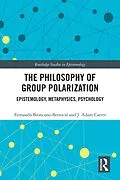Group polarization-the tendency of groups to incline toward more extreme positions than initially held by their individual members-has been rigorously studied by social psychologists, though in a way that has overlooked important philosophical questions. This is the first book-length treatment of group polarization from a philosophical perspective.
The phenomenon of group polarization raises several important metaphysical and epistemological questions. From a metaphysical point of view, can group polarization, understood as an epistemic feature of a group, be reduced to epistemic features of its individual members? Relatedly, from an epistemological point of view, is group polarization best understood as a kind of cognitive bias or rather in terms of intellectual vice? This book compares four models that combine potential answers to the metaphysical and epistemological questions. The models considered are: group polarization as (i) a collective bias; (ii) a summation of individual epistemic vices; (iii) a summation of individual biases; and (iv) a collective epistemic vice. Ultimately, the authors defend a collective vice model of group polarization over the competing alternatives.
The Philosophy of Group Polarization will be of interest to students and researchers working in epistemology, particularly those working on social epistemology, collective epistemology, social ontology, virtue epistemology, and distributed cognition. It will also be of interest to those working on issues in political epistemology, applied epistemology, and on topics at the intersection of epistemology and ethics.
Autorentext
Fernando Broncano-Berrocal is a Talent Attraction Fellow at the Autonomous University of Madrid, Spain. He works mainly in epistemology, with an emphasis on virtue epistemology, philosophy of luck, social epistemology, and collective epistemology. He is the co-editor, with J. Adam Carter, of The Epistemology of Group Disagreement (Routledge, 2021). His work has appeared in such places as Philosophical Studies, Analysis, Synthese, and Erkenntnis.
J. Adam Carter is Reader in Philosophy at the University of Glasgow, UK. His expertise is mainly in epistemology with particular focus on virtue epistemology, social epistemology relativism, know-how, epistemic luck, and epistemic defeat. He is the author of Metaepistemology and Relativism (2016), co-author of A Critical Introduction to Knowledge-How (2018), and co-editor, with Fernando Broncano-Berrocal, of The Epistemology of Group Disagreement (Routledge, 2021). His work has appeared in Noûs, Philosophy and Phenomenological Research, Philosophical Studies, Analysis, and thenAustralasian Journal of Philosophy.
Klappentext
Group polarization-the tendency of groups to incline towards more extreme positions than initially held by their individual members-has been rigorously studied by social psychologists, though in a way that has overlooked important philosophical questions. This is the first book-length treatment of group polarization from a philosophical perspective.
The phenomenon of group polarization raises several important metaphysical and epistemological questions. From a metaphysical point of view, can group polarization, understood as an epistemic feature of a group, be reduced to epistemic features of its individual members? Relatedly, from an epistemological point of view, is group polarization best understood as a kind of cognitive bias or rather in terms of intellectual vice? This book compares four models which combine potential answers to the metaphysical and epistemological questions. The models considered are: group polarization as 1) a collective bias; 2) a summation of individual epistemic vices; 3) a summation of individual biases; and 4) a collective epistemic vice. Ultimately, the authors defend a collective vice model of group polarization over the competing alternatives.
The Philosophy of Group Polarization will be of interest to students and researchers working in epistemology, particularly those working on social epistemology, collective epistemology, social ontology, virtue epistemology and distributed cognition. It will also be of interest to those working on issues in political epistemology, applied epistemology, and on topics at the intersection of epistemology and ethics.
Inhalt
Preface
Chapter 1. The Philosophy of Polarization Phenomena
Chapter 2. The Psychology of Group Polarization
Chapter 3. The Epistemology of Group Polarization
Chapter 4. Four Models of Group Polarization
Chapter 5. The Reductive Virtue/Vice Model
Chapter 6. The Collective Heuristic/Bias Model
Chapter 7. The Reductive Heuristic/Bias Model
Chapter 8. The Collective Virtue/Vice Model
Chapter 9. Mitigating the Epistemic Pitfalls of Group Polarization
Concussion: Future Directions
